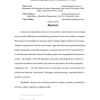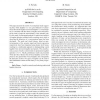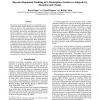75 search results - page 8 / 15 » An Empirical Approach to the Interpretation of Superlatives |
IJPRAI
2002
14 years 11 months ago
2002
Decision-tree algorithms are known to be unstable: small variations in the training set can result in different trees and different predictions for the same validation examples. B...
ICMCS
2009
IEEE
14 years 9 months ago
2009
IEEE
This paper presents the results of an empirical study suggesting that, while laughter is a very good indicator of amusement, the kind of laughter (unvoiced laughter vs.voiced laug...
112
click to vote
JMLR
2010
14 years 6 months ago
2010
We show how a preselection of hidden variables can be used to efficiently train generative models with binary hidden variables. The approach is based on Expectation Maximization (...
149
click to vote
3DIM
2011
IEEE
14 years 2 days ago
2011
IEEE
—Predictive modeling aims at constructing models that predict a target property of an object based on its descriptions. In digital human modeling, it can be applied to predicting...
AAAI
2006
15 years 1 months ago
2006
We present a model for buying agents in e-marketplaces to interpret evaluations of sellers provided by other buying agents, known as advisors. The interpretation of seller evaluat...



